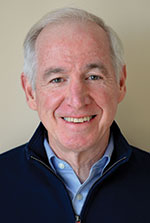Reflection / John Shaughnessy
The questions we all need to ask ourselves
 It was a soul-searching moment in the love story of a husband and a wife.
It was a soul-searching moment in the love story of a husband and a wife.
Legendary football coach Lou Holtz shared the moment years ago when his wife Beth was recovering from cancer.
“My wife doesn’t do many interviews because she said one person in the public life is enough,” Holtz said at the time. “But she gave one interview … and that was about her cancer. I’ll never forget, the question was, ‘What did you learn from having cancer?’
“She said, ‘I learned how much my family loved me.’ ” Pausing, the former head coach at the University of Notre Dame added, “We didn’t love her anymore because she had cancer. We showed her more. Isn’t it a shame that we have to let somebody have a catastrophe before we say, ‘We love you. We appreciate how special you are.’ ”
I thought of that moment again when I learned that Beth Holtz had died on June 30
at the age of 82, more than 20 years after being diagnosed with cancer—years in which she continued to be involved in charitable work that benefitted others.
Her approach to life reflected the same attitude that her husband of nearly 59 years always encouraged his players to embrace: Keep striving to improve.
It’s a message Holtz has shared often as a motivational speaker, a message he sums up in this thought: “There’s a rule of life that says you’re either growing or you’re dying. Trees either grow or they’re dying. So does grass. So does a marriage. So does a business. So does a person. It doesn’t have anything to do with age. It has everything to do with, ‘Are you trying to maintain or are you trying to get better?’
“Any time you’re trying to maintain in this world, you never have a reason to celebrate, you never have new ideas. Being enthusiastic about what you do is critical. It’s about having dreams and goals. Regardless of what age you are, there have to be things you want to accomplish, things you want to do.”
For Holtz, that approach to life also leads to a set of questions that he believes we all need to ask ourselves.
“If I didn’t show up, who would miss me and why? If you didn’t go home, would your family miss you? And if they did, why? If you didn’t show up for work on Monday, would anybody miss you?
“We should all aspire to make sure that we live our lives in such a way that if we didn’t show up, somebody would miss us. Not because we’re valuable. Not because we’re talented. But because we add value to other people’s lives.”
A few years ago, I came across a Bible verse that has stayed with and challenged me ever since. It’s from the Gospel of John, “He must increase; I must decrease” (Jn 3:30).
Obviously, the words are a call to make Christ the greater focus in our lives while lessening our obsession with ourselves. At the same time, the more I’ve thought about these words, the more I’ve realized that they also could—and should—apply to other relationships in my life: as a spouse, as a parent, as a son, as a brother, as a friend.
I must decrease in my focus on my desires, my wants and my needs while increasing my awareness of the other person’s desires, wants and needs.
Imagine the potential of a marriage, a friendship, a parent-child relationship when both parties follow the approach of “I must decrease, you must increase.” It would be amazing. Of course, it’s also amazingly hard for many of us to do—to put the needs and desires of someone else ahead of our own. At least it’s a struggle for me.
Yet in the times I’ve been successful in those efforts, I’ve moved closer to that person. It also has moved me closer to God. So in decreasing our emphasis on ourselves, we increase the potential to deepen our relationships and become a better, more valued individual.
Embrace those six words—“I must decrease, you must increase”—and you’ll always have the right answer to Holtz’ question, “Are you trying to maintain or are you trying to get better?”
Embrace those six words in your relationships and you’ll surpass the standard of Holtz’ challenge: “We should all aspire to make sure that we live our lives in such a way that if we didn’t show up, somebody would miss us. Not because we’re valuable. Not because we’re talented. But because we add value to other people’s lives.”
Commit to being great—for others.
(John Shaughnessy is the assistant editor of The Criterion. This reflection is adapted from his latest book, Then Something Wondrous Happened: Unlikely encounters and unexpected graces in search of a friendship with God.) †
 It was a soul-searching moment in the love story of a husband and a wife.
It was a soul-searching moment in the love story of a husband and a wife.